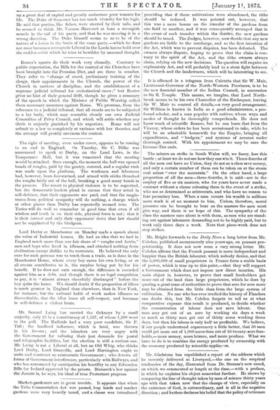Mr. Bright forwards to the Daily News a long letter
from Mr. Cobden, published anonymously nine years ago, on peasant pro- prietorship. It does not now seem a very strong letter. Mr. Cobden affirms that the French peasant is more independent and happier than the British labourer, which nobody denies, and that the 5,000,000 of small proprietors in France form a stable basis of power, which is true up to this point,—that they will support a Government which does not impose new direct taxation. His main object is, however, to prove that small freeholders get more out of the land than large proprietors, which he does by quoting a great mass of authorities to prove that acre for acre more may be obtained from the little than from the large system of cultivation. No one who has ever studied the history of Flanders can doubt this, but Mr. Cobden forgets to tell us at what comparative expense this result is produced, to decide whether the concentration of labour does not save labour. One man may get out of an acre by working six days a week as much as thirty men get out of thirty acres working three days, but then his labour is only half-as profitable. We believe, if our people understood coparcenery a little better, that 50 men could get more out'of 1,000 acres than out of 50 twenty-acre free- holds,—more money, more leisure, and more produce. What we have to do is to combine the energy produced by ownership with the economy produced by scientific appliwes.


































 Previous page
Previous page